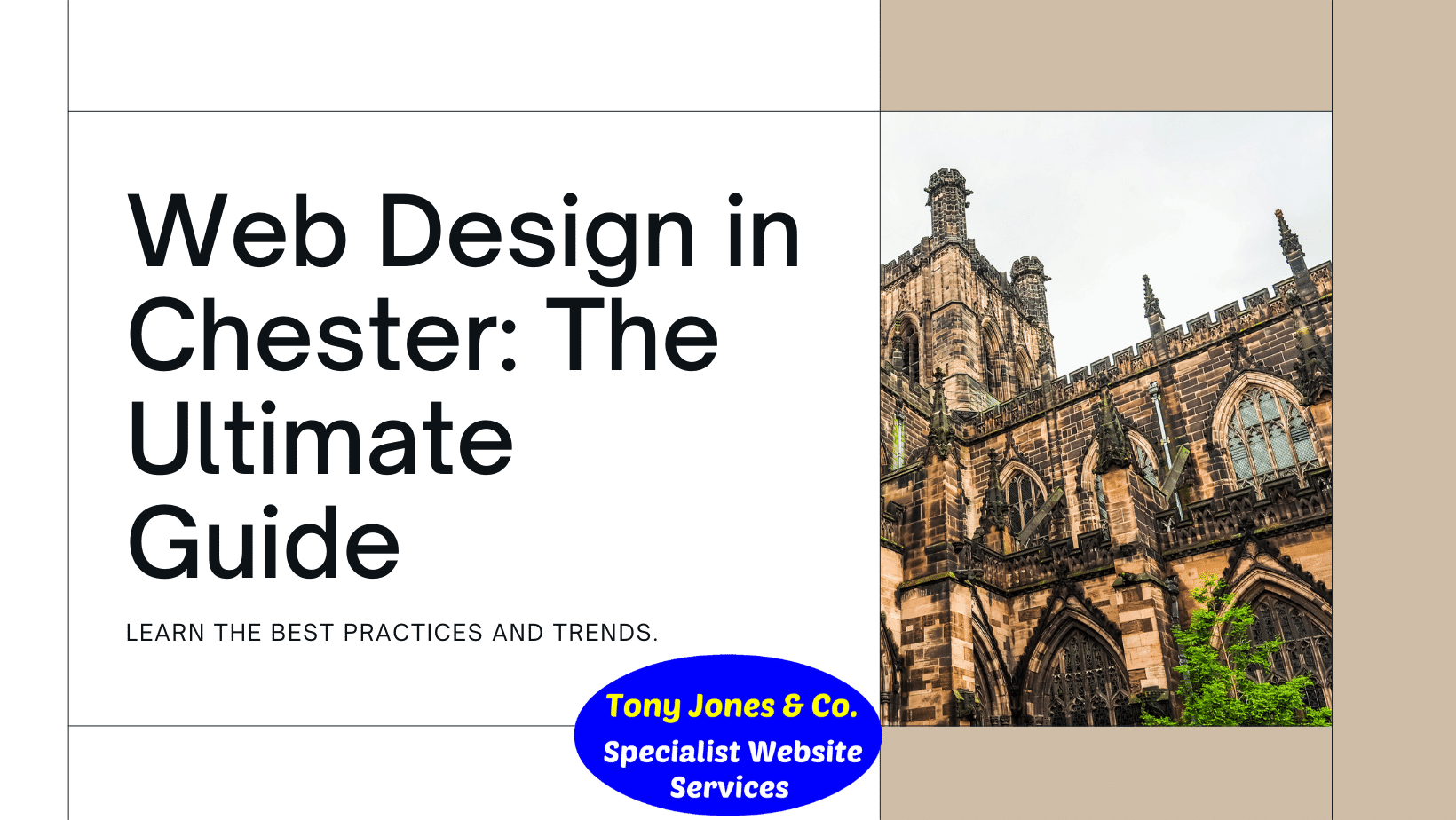Web Designer Wrexham, Professional Website Services - Tony Jones CITP, FBCS.
Unlocking Success: Mastering the Art of Improving Google Search Ranking
Master improving Google search ranking with our comprehensive guide to SEO strategies for small businesses.

Understanding Google Search Ranking
Before diving into the world of SEO and learning about strategies for improving Google search ranking, it's essential to understand how Google Search works and why its ranking is so crucial for businesses.
How Google Search Works
At its core, Google Search aims to provide users with the most relevant and high-quality results for their queries. It does this by crawling and indexing billions of webpages, then ranking them based on hundreds of factors, known as "ranking signals". These signals include factors like keywords, site relevance to the search query, website quality and more.
When a user submits a search query, Google's algorithms sift through its vast index to find and present the most relevant results. This process is both quick and efficient, ensuring users find the information they're seeking promptly. For a deeper understanding of how Google's search algorithms work, have a look at our comprehensive guide on how to get on page one of Google.
The Importance of Google Search Ranking
Being visible on the first page of Google's search results can significantly impact a business's online presence. Studies indicate that websites listed on the first page of Google receive the majority of clicks, with the top three results getting the most traffic.
Google Search PositionPercentage of Clicks131.7%224.7%318.6%4-1025%
This highlights the importance of improving Google search ranking. A higher ranking means more visibility, more traffic, and potentially, more customers. It's why businesses invest time, resources, and effort into implementing effective SEO techniques for higher Google ranking.
It's crucial to remember that SEO isn't a one-time task but an ongoing process. The world of search is continually evolving, with Google regularly updating its algorithms. Businesses need to adapt their SEO strategies to keep up with these changes and ensure they stay competitive in the search results.
In the upcoming sections, we'll delve into the basics of SEO, explore effective on-page and off-page SEO strategies, understand the importance of technical SEO, and learn how to monitor and improve your SEO strategy for the best results.
Basics of SEO
In the quest to understand the essential strategies for improving Google search ranking, we must first delve into the basics of SEO, or Search Engine Optimisation. The concepts of SEO and how they impact Google search ranking lay the foundation for the development of an effective SEO strategy.
What is SEO?
Search Engine Optimisation, commonly referred to as SEO, is a digital marketing strategy focused on optimising a website to enhance its visibility in search engine results pages (SERPs). In essence, SEO involves making specific changes to the website design and content that make the site more attractive to a search engine.
Though search engines are equipped to understand and rank all types of content, SEO is necessary as it helps the search engines interpret the content in ways they can understand. SEO involves a variety of techniques and strategies, all aimed at improving a website's visibility and ranking in search results. The overall goal is to increase the volume of organic (non-paid) traffic to your website by ensuring it ranks highly for relevant search terms or keywords.
How SEO Impacts Google Search Ranking
SEO has a significant impact on Google search ranking. Google's search algorithms are designed to deliver the most relevant and high-quality results to users based on their search queries. By optimising your website for factors that these algorithms consider, you can improve your site's ranking in Google search results.
Google's ranking factors include relevancy (how closely your content matches the search query), site speed, mobile-friendliness, site security, and many others. SEO works by optimising your site for these factors, making it more likely that your site will rank higher in the search results.
A higher Google search ranking can provide numerous benefits for your business. These include increased visibility, more organic traffic, and an enhanced online reputation. In the long run, a high search ranking can lead to increased customer trust, more leads and conversions, and ultimately, business growth.
For further insights into how to enhance your site's visibility and ranking, refer to our articles on how to get on page one of Google and SEO techniques for higher Google ranking.
Understanding the basics of SEO is the first step towards improving Google search ranking. The next steps involve diving deeper into various SEO strategies such as keyword optimisation, on-page SEO, off-page SEO, and technical SEO, all of which we will cover in the following sections.
Keywords and SEO
In the quest for improving Google search ranking, understanding the role of keywords in Search Engine Optimization (SEO) is a fundamental step. Keywords are the backbone of SEO and a critical element in getting your website to rank on the first page of Google search results.
Understanding the Role of Keywords
Keywords are the specific set of words or phrases that users type into search engines when looking for information or services. In the context of SEO, they act as the link between what people are searching for and the content you are providing to fill that need.
When your website content includes these keywords in a meaningful and reader-friendly manner, search engines like Google are more likely to index your pages and display them as top results for those search terms. This increases the visibility of your site, thereby attracting more traffic and potentially leading to higher conversion rates.
The key to successful use of keywords in SEO lies in understanding your target audience and its search behavior. By integrating the right keywords into your content, you can effectively communicate with your audience through search engines.
For more insights on the importance of keywords in SEO, check out our article on organic SEO for top Google ranking.
Researching and Selecting the Right Keywords
The process of keyword research involves identifying popular words and phrases people enter into search engines that are relevant to your business and industry. This step is crucial in formulating a successful SEO strategy for improving Google search ranking.
There are several factors to consider when selecting the right keywords:
- Relevance: The keyword should be highly relevant to your business and the content on your website.
- Search Volume: Ideally, the keyword should have a high search volume, indicating that it is commonly searched for by users.
- Competition: Keywords with lower competition are easier to rank for. Highly competitive keywords may require more comprehensive SEO strategies.
Here's a simple representation of these factors in a table:
FactorsDescriptionRelevanceThe keyword should be highly related to your business and content.Search VolumeThe keyword should have a high number of average monthly searches.CompetitionLower competition keywords are easier to rank for.
Choosing the right keywords is a delicate balance between reaching the largest audience possible and targeting a niche enough to rank highly on Google. Implementing these keywords into your website's content and meta tags can significantly enhance your SEO efforts.
For more practical tips on keyword research and selection, explore our guide on SEO techniques for higher Google ranking. By understanding and implementing the right keywords, you can take a significant step towards improving your website's Google search ranking.
On-Page SEO Strategies
On-page SEO strategies are fundamental to improving Google search ranking. These practices involve optimising different parts of your website that affect search engine rankings. Key areas of focus include content, meta tags, and image optimisation.
Importance of Quality Content
Quality content is the cornerstone of on-page SEO. It provides value to visitors, encourages them to stay longer on your site, and enhances the chances of earning backlinks. These factors influence the perceived relevance and authority of your website, thereby improving its Google search ranking.
When crafting content, ensure it is:
- Relevant to your audience
- Unique and original
- Engaging and interactive
- Rich in keywords without stuffing
Incorporate internal links to bolster the user experience and make navigation easier. A well-structured content strategy can lead to higher engagement rates, lower bounce rates, and improved chances of ranking on the first page of Google. For more insights on crafting an effective content strategy, check out our article on how to get on page one of Google.
Meta Tags and SEO
Meta tags are snippets of text that describe a page's content but do not appear on the page itself. They exist in the page's HTML code and are read by search engines. The most important meta tags for SEO are the title tag and the meta description.
The title tag is a primary factor for Google's algorithm and directly impacts rankings. It should be unique, descriptive, and include your target keyword.
The meta description is a brief summary of the page's content. Although it does not directly impact rankings, a well-written meta description can improve click-through rates.
Both should be crafted to attract the user's attention in the search engine results page (SERP) and encourage click-throughs. More information about the role of meta tags can be found in our article on seo techniques for higher google ranking.
Image Optimisation and SEO
Images can significantly enhance a user's experience on your site. However, they need to be optimised effectively to contribute positively to your site's overall SEO.
Key aspects of image optimisation include:
- Image file size: Larger images can slow down page load times, negatively impacting SEO. Compress images to keep file sizes to a minimum.
- Alt text: This is a brief description of the image, which helps search engine crawlers understand the content of the image. Include your target keyword in the alt text where appropriate.
- File name: Name your image files descriptively and in plain language. This is another opportunity to incorporate your keyword.
Remember, a well-optimised website has the best chance of achieving a higher Google search ranking. Each element on your page, from the content to the images, plays a crucial role in your overall SEO strategy. For more advanced strategies, explore our article on organic SEO for top Google ranking.
Off-Page SEO Strategies
Off-page SEO strategies are efforts taken outside of your website to improve its position in search engine rankings. These strategies are crucial for improving Google search ranking and involve enhancing the website's reputation and authority. Let's delve into the three primary off-page SEO strategies: backlinks, social signals, and online directory listings.
The Power of Backlinks
Backlinks, also known as inbound links, are links from other websites that point to your site. They act as endorsements, signalling to search engines that your content is valuable and trustworthy. Quality backlinks from reputable and relevant sites can significantly boost your website's visibility in Google search results.
To build quality backlinks, one can:
- Create high-quality content that others will want to link to
- Guest post on reputable sites within your industry
- Engage with influencers or bloggers in your industry
Remember, the quality of backlinks is more important than quantity. Google's algorithms are sophisticated enough to distinguish between spammy links and genuine backlinks from authoritative sites. For strategies on how to secure quality backlinks, check out our article on organic SEO for top Google ranking.
Social Signals and SEO
Social signals refer to the likes, shares, comments, and overall social media visibility that your website garners. While Google has stated that social signals are not a direct ranking factor, there is a correlation between social signals and ranking position.
Highly shared and liked content tends to perform better in search engine rankings. This is likely because social media success can lead to increased online visibility and more backlinks.
To enhance your social signals, ensure to:
- Create engaging, shareable content
- Promote your content on suitable social media platforms
- Engage with your audience on social media
For more insights on how social signals can contribute to improving Google search ranking, refer to our article on SEO techniques for higher Google ranking.
Online Directory Listings and SEO
Online directories are platforms where you can list your business details, such as name, address, and contact information. Some popular directories include Google My Business and Bing Places. Having consistent and accurate listings in these directories can enhance your online presence and improve your local search rankings.
To leverage online directories:
- Ensure your business information is accurate and consistent across all directories
- Encourage customers to leave reviews on these platforms
- Regularly update your listings with fresh content and images
Read our article on SEO tips for top Google ranking for a more comprehensive understanding of how online directory listings can help in enhancing your Google search ranking.
Incorporating these off-page SEO strategies into your SEO campaign can significantly contribute to your website's visibility and ranking on Google. Remember, SEO is a long-term process and requires time, effort, and patience. Be sure to continuously monitor, adjust, and refine your strategies based on your website's performance metrics.
Technical SEO
In the quest for improving Google search ranking, technical SEO plays a pivotal role. It forms the backbone of SEO strategies and encompasses elements such as website structure, mobile optimisation, and page speed.
Website Structure and SEO
The structure of your website can significantly influence its Google search ranking. A well-organised website with clear and logical navigation is not just user-friendly but also easier for search engines to crawl and index.
A vital aspect of website structure is the URL structure. URLs should be simple, readable, and descriptive. Incorporating keywords into URLs can enhance SEO.
Another critical factor is the internal linking structure. By linking to other pages on your website, you can guide visitors and search engine bots, improving the discoverability of your content. For more in-depth knowledge on how website structure affects SEO, refer to our guide on google page one ranking strategy.
Mobile Optimisation and SEO
With mobile internet usage overtaking desktop, mobile optimisation has become a crucial factor in improving Google search ranking. Google uses mobile-first indexing, meaning it looks at the mobile version of your website for indexing and ranking.
Mobile optimisation ensures your website looks and works great on mobile devices. This includes responsive design, easy navigation, fast load times, and readable content. Websites that are not mobile-friendly can suffer a significant drop in their search ranking. For more tips on mobile optimisation, check out our article on seo techniques for higher google ranking.
Page Speed and SEO
Page speed, or load time, is another critical technical SEO factor. A slow-loading website can frustrate users and increase bounce rates, which can negatively impact your Google search ranking.
Improving page speed involves optimising images, enabling browser caching, reducing server response time, and minimising the use of render-blocking JavaScript and CSS. Google's PageSpeed Insights tool can provide a comprehensive analysis of your website's load time and offer suggestions for improvement. For a deeper understanding of how page speed affects SEO, refer to seo tips for top google ranking.
When it comes to technical SEO, every little detail counts. A technically sound website not only provides a better user experience but also makes it easier for search engines to crawl, index, and rank your website. Hence, it's a crucial component of any strategy aimed at improving Google search ranking.
Monitoring and Improving Your SEO Strategy
When it comes to improving Google search ranking, it's crucial to continuously monitor and adapt your SEO strategy. In this section, we'll explore the tools that can help track SEO performance and discuss ways to adjust your strategy based on performance data.
Tools for Tracking SEO Performance
Several tools can assist small business owners in monitoring their website's SEO performance. These tools can provide insights into keyword rankings, organic traffic, backlink profiles, and more, helping you understand how your website is performing in search engine results.
Some tools for tracking SEO performance include:
- Keyword Ranking Tools: These tools show where your website ranks for specific keywords. They help identify the keywords that are working and those that need improvement.
- Traffic Analysis Tools: These tools provide data on the volume and source of your website's traffic. They can help you understand how users are finding your site.
- Backlink Analysis Tools: Backlinks are a crucial part of SEO. These tools help you monitor the number and quality of backlinks to your site.
- Site Audit Tools: These tools perform an overall analysis of your website, providing insights into areas that could be hindering your SEO efforts.
For more information, visit our article on SEO techniques for higher Google ranking.
Type of ToolFunctionKeyword Ranking ToolsMonitor keyword rankingsTraffic Analysis ToolsAnalyse traffic sources and volumesBacklink Analysis ToolsTrack backlinks and their qualitySite Audit ToolsPerform an overall SEO health check
How to Adapt SEO Strategy Based on Performance Data
Once you've gathered performance data, it's essential to analyse this information and use it to adapt your SEO strategy. Here are a few ways to do so:
- Optimize Keywords: If certain keywords aren't performing well, consider optimizing your content to better target these phrases.
- Improve Low-Performing Pages: If specific pages have low organic traffic, look into improving their content, meta tags, or loading times.
- Build Quality Backlinks: If your backlink profile is weak, consider strategies to earn more quality backlinks, such as guest blogging or influencer outreach.
- Fix Technical Issues: If your site audit uncovers technical issues, such as slow loading times or mobile unfriendliness, work to resolve these issues to improve your Google search ranking.
Remember, SEO is not a one-time job but a continuous process. Regularly monitoring your performance and making necessary adjustments is the key to achieving and maintaining a high Google search ranking.
For more tips, visit our article on SEO tips for top Google ranking.
StrategyActionOptimize KeywordsAdjust content to target underperforming keywordsImprove Low-Performing PagesEnhance content, meta tags, or loading timesBuild Quality BacklinksImplement strategies like guest blogging or influencer outreachFix Technical IssuesResolve issues like slow loading times or mobile unfriendliness
Share on:
Questions or further information; please call Tony 07990 797302
About the author Tony Jones CITP FBCS:
An experienced and qualified Web Designer based in Wrexham, a Chartered IT Professional and a Fellow of the British Computer Society.
Contact us
More news and articles: - Websites, Design, SEO, Artificial Intelligence, anything Digital Technology.











